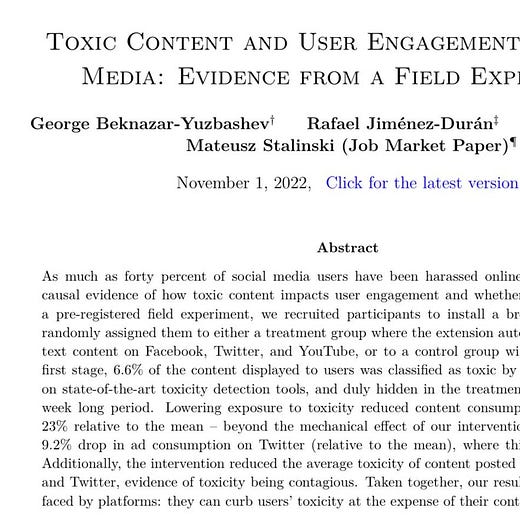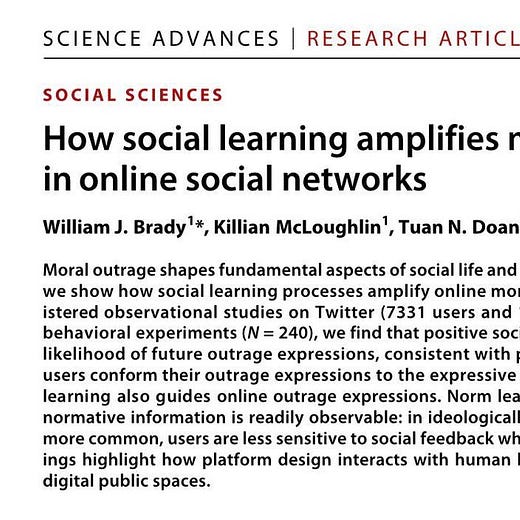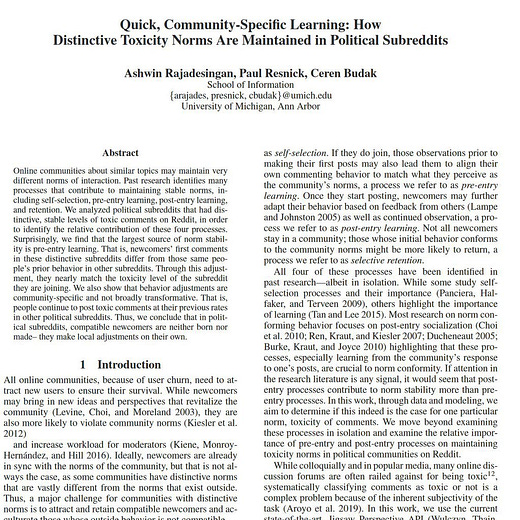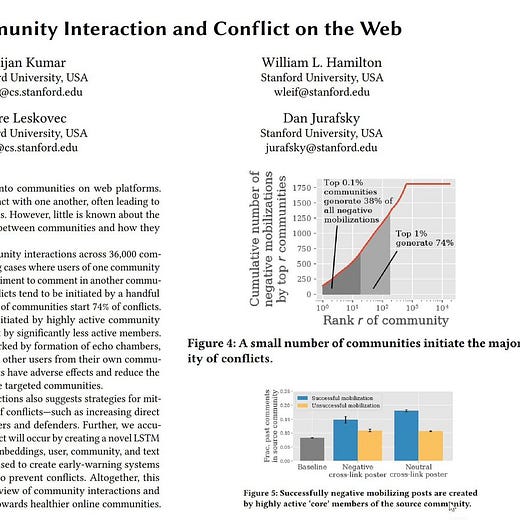The internet wants to be fragmented
Throwing the whole world into a single room together doesn't work.
Five years ago I was sitting around drinking a beer with my college buddy Dayv. I was scrolling through Twitter and watching people get mad at Donald Trump’s latest outrage, and I said “You know…fifteen years ago, the internet was an escape from the real world. Now the real world is an escape from the internet.” “Tweet that!”, Dayv said, so I did. That banal observation became my most popular tweet of all time, and the quote has now been posted ad infinitum on content mills all over the web.
Why did such a bland observation resonate with so many people? It’s easy to see why the internet now feels like a place we need to flee from. The smartphone physically attached the internet to our persons; now we take the internet wherever we go, and its little colored icons are always beckoning, telling us to abandon whoever we’re talking to or whatever we’re working on and check the latest posts. But what’s harder to remember is why the internet used to be an escape from the real world.
When I first got access to the internet as a kid, the very first thing I did was to find people who liked the same things I liked — science fiction novels and TV shows, Dungeons and Dragons, and so on. In the early days, that was what you did when you got online — you found your people, whether on Usenet or IRC or Web forums or MUSHes and MUDs. Real life was where you had to interact with a bunch of people who rubbed you the wrong way — the coworker who didn’t like your politics, the parents who nagged you to get a real job, the popular kids with their fancy cars. The internet was where you could just go be a dork with other dorks, whether you were an anime fan or a libertarian gun nut or a lonely Christian 40-something or a gay kid who was still in the closet. Community was the escape hatch.
Then in the 2010s, the internet changed. It wasn’t just the smartphone, though that did enable it. What changed is that internet interaction increasingly started to revolve around a small number of extremely centralized social media platforms: Facebook, Twitter, and later Instagram.
From a business perspective, this centralization was a natural extension of the early internet — people were getting more connected, so just connect them even more. Why have everyone make their own websites when everyone’s homepage could just be their Facebook page? Why try to track people down in IRC chat rooms when you could just talk to anyone directly on Twitter? Putting everyone in the world in touch through a single network is what we did with the phone system, and everyone knows that the value of a network scales as the square of the number of users. So centralizing the whole world’s social interaction on two or three platforms would print loads of money while also making for a happier, more connected world.
It certainly did the former. Facebook became an all-conquering corporate behemoth, and Twitter managed to stay profitable and secure from competition in spite of being notoriously poorly managed. But almost immediately after the great centralization of the 2010s, I started noticing that something was wrong with the internet I had come to know and love.
It started with the Facebook feed. On the old internet, you could show a different side of yourself in every forum or chat room; but on your Facebook feed, you had to be the same person to everyone you knew. When social unrest broke out in the mid-2010s this got even worse — you had to watch your liberal friends and your conservative friends go at it in the comments of your posts, or theirs. Friendships and even family bonds were destroyed in those comments.
At first Twitter seemed less bad than the Facebook feed, since you didn’t have to reveal your real identity if you didn’t want to. But Twitter was far more extreme in the way it threw everyone in the whole world together. Your family and friends might fight on Facebook, but at least you didn’t have to get deluged with angry comments from random anonymous Nazis or communists or weirdos mad about video game journalism.
The early 2010s on Twitter were defined by fights over toxicity and harassment versus early-internet ideals of free speech. But after 2016 those fights no longer mattered, because everyone on the platform simply adopted the same patterns of toxicity and harassment that the extremist trolls had pioneered. By 2019 you could get mobbed by angry librarians, or Saturday Night Live fans, or history professors. The only defense against an angry mob was to get your own angry mob. Twitter felt like a prison, and in prison you need a gang to survive.
Why did this happen to the centralized internet when it hadn’t happened to the decentralized internet of previous decades? In fact, there were always Nazis around, and communists, and all the other toxic trolls and crazies. But they were only ever an annoyance, because if a community didn’t like those people, the moderators would just ban them. Even normal people got banned from forums where their personalities didn’t fit; even I got banned once or twice. It happened. You moved on and you found someone else to talk to.
Community moderation works. This was the overwhelming lesson of the early internet. It works because it mirrors the social interaction of real life, where social groups exclude people who don’t fit in. And it works because it distributes the task of policing the internet to a vast number of volunteers, who provide the free labor of keeping forums fun, because to them maintaining a community is a labor of love. And it works because if you don’t like the forum you’re in — if the mods are being too harsh, or if they’re being too lenient and the community has been taken over by trolls — you just walk away and find another forum. In the words of the great Albert O. Hirschman, you always have the option to use “exit”.
From Twitter, however, there seemed to be no exit. Where would you go? If you were a journalist, Twitter was the source for all the most up-to-the-minute news. If you were a regular person who disagreed with journalists and wanted to yell directly in their faces, Twitter was the only place you could do that. If you wanted to mix it up in the neverending scrum of political and cultural affairs, Twitter was where you could get the largest audience for that, and feel like you had the largest impact. It was easy to clone Twitter — right-wingers tried several times, with Gab, Parler, and Truth Social — but it felt like the network effect of the original just couldn’t be overcome. So you went back day after day, to endure the toxicity of the dunk-mobs and throw yourself once more into the fight.
And the people who ran Twitter on the corporate side had no intention of changing this at all. They may have talked a good game about “free speech” — everyone does — but what they really wanted was to keep making money. They tinkered at the edges of the platform, but never touched their killer feature, the quote-tweet, which Twitter’s head of product called “the dunk mechanism.” Because dunks were the business model — if you don’t believe me, you can check out the many research papers showing that toxicity and outrage drive Twitter engagement.
The company’s hapless, incompetent management couldn’t figure out any better model, so they clung doggedly to what they had. They steadfastly resisted anything that would smack of community moderation — dropping blocked users’ comments from thread view, allowing users to remove replies from their threads, etc.
Caught between the easy profitability of network effects and growing anger over toxicity, the big social media platforms turned to centralized moderation. Unsurprisingly, this didn’t work. Not only was it an impossible task for the moderators themselves, but it meant that the management of the company was basically required to take an editorial slant. That effectively wrecked the image of the social media companies. And because Twitter’s editorial slant leaned slightly left-of-center, this made conservatives especially mad. Facebook, realizing the impossibility of the task, finally just decided to move its feed away from news entirely; Twitter, of course, couldn’t do this.
As this situation persisted, I began to notice a trend. People were taking their discussions about news, politics, and public affairs off of Twitter and into much smaller forums — first to Twitter DM groups, then to WhatsApp, Signal, and Discord. They still maintained their Twitter accounts and said a few things in public, but their honest opinions more and more were said in the privacy of a trusted group of friends and ideologically aligned acquaintances (and the occasional economics blogger who comes off as ideologically tolerant enough to be admitted to both right-wing and left-wing groups). Slowly, people seemed to be rediscovering the truth that the old internet had taught us — that discussions work better when you can pick and choose who you’re talking to.
Then Elon Musk came along.
Musk is a meteor crashing into the ossified dinosaur-world of Twitter, wreaking havoc on its community and its norms (if not yet its basic functionality). Nowadays if you go on Twitter, you’ll find it absolutely absorbed by Musk’s latest move — today, it’s arbitrarily banning journalists who criticized him, yesterday it was banning an account that tracked his private jet. Tomorrow it will be something else.
It remains to be seen whether Musk’s right-leaning centralized moderation will be enough to cause an exodus of the generally left-leaning journalists who give Twitter its reputation as the mainstream media’s “assignment desk”, or cause advertisers to abandon the platform, or result in a more general move to alternative sites. If core users in general do decide to leave, expect the platform to decline pretty abruptly.
But what’s interesting is that even the people who do expect this sort of exodus don’t seem to believe that there will be another single, unified platform that just replaces Twitter. The look and functionality of the original is simple to replicate, but no one seems to think that everyone will just move to New Twitter; everyone seems to expect that if and when Twitter does decline, the future is fragmented.
Because maybe, just maybe, we’ve learned our lesson. Maybe we’ve realized that the internet simply works better as a fragmented thing.
Centralized social media, as Jack Dorsey wrote, was a grand experiment in collective global human consciousness. It was a modern-day Tower of Babel, the Human Instrumentality project from Neon Genesis Evangelion. Yes it was a way to make some people rich, but it was also an experiment in uniting the human race. Perhaps if we could all just get in one room and talk to each other, if we could just get rid of our echo chambers and our filter bubbles, we would eventually reach agreement, and the old world of war and hate and misunderstanding would melt into memory.
That experiment failed. Humanity does not want to be a global hive mind. We are not rational Bayesian updaters who will eventually reach agreement; when we receive the same information, it tends to polarize us rather than unite us. Getting screamed at and insulted by people who disagree with you doesn’t take you out of your filter bubble — it makes you retreat back inside your bubble and reject the ideas of whoever is screaming at you. No one ever changed their mind from being dunked on; instead they all just doubled down and dunked harder. The hatred and toxicity of Twitter at times felt like the dying screams of human individuality, being crushed to death by the hive mind’s constant demands for us to agree with more people than we ever evolved to agree with.
But human individuality would not die. Instead it is centralized social media that is dying. Social media network effects are strong, but not infinitely strong. A recent survey found that only a third of U.S. teens use Facebook at all, down from over 70% just half a decade ago. And even before Musk’s takeover, the fraction of teens on Twitter had declined from 33% to 23%.
In place of centralized social media we see a few things rising. First, there’s TikTok and YouTube; although these do have some comment features, overall they’re far more similar to television, radio, and traditional one-way push media, with content driven by algorithms instead of user sharing. Second, Snapchat and Instagram, which are geared much more toward personal interactions and less toward public discussions. And though they weren’t included in the survey, my general sense from both anecdotes and overall usage trends is that chat apps — WhatsApp, Signal, Discord, etc. — are becoming more popular.
What these rising apps and platforms all share is fragmentation. Whether it’s intentional self-sorting into like-minded or community-moderated groups, or the natural fragmentation that comes from a bunch of different people watching their own algorithmically curated video feeds, these apps all have a way of separating people based on who they want to talk to and what they want to be exposed to.
This is how we restore the old internet — not in its original form, but in its glorious, fragmented essence. People call Twitter an indispensable public space because it’s the “town square”, but in the real world there isn’t just one town square, because there isn’t just one town. There are many. And the internet works when you can exit — when you can move to a different town if you don’t like the mayor or the local culture. This doesn’t mean we need a world where nobody talks to anyone we disagree with — instead of thick walls, we need semipermeable membranes. And a fragmented internet, where people can try out multiple spaces and move from forum to forum, is perfect for providing those membranes. Disagreement in society is necessary for progress, but it’s most constructive when it’s mediated by bonds of trust and affinity and semi-privacy. Our boundaries will always rub up against each other, but we need some boundaries.
Perhaps someday the human race will be ready to become one collective consciousness. But the experiment of the 2010s shows that this day is not today. Let the internet once more be an escape — a place where you can find your people and be happy. Let us learn to speak a thousand different languages once again. Let the Tower of Babel fall.









Surprised to see no mention of Reddit. Reddit is basically what you mention, smaller interest based communities with community moderation.
Of course, Reddit can be pretty toxic though too, lol.
This is perceptive. An odd part to the story is one company that seemed great at cracking this sort of thing also realized this issue, but its solution completely failed - Google, with Google Plus.
Their big advance was supposed to be "Circles", where you could sort your contacts into different groups whom you'd then post different content to, basically have different social networks with within the Plus umbrella.
There's a lot of reasons this (Plus generally, and this solution specifically) didn't work. But I wish it or something like it had.
Google's failure vis-a-vis Facebook convinced everyone Facebook's theory of the Internet (or at least social media) was right and Google's wrong. But I think this article, and Facebook's performance the last several years, shows otherwise, to the detriment of all of us.